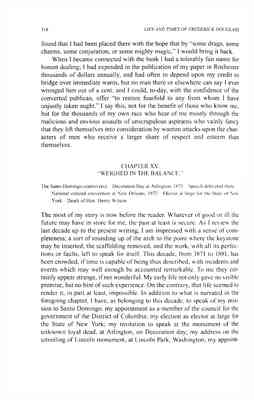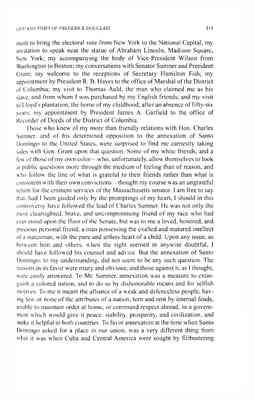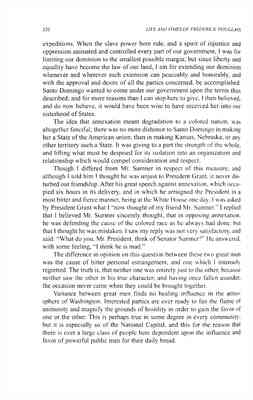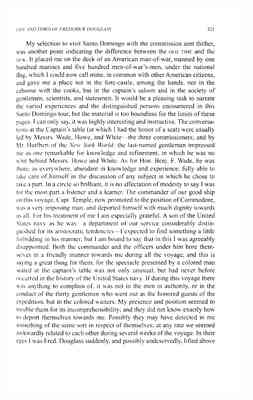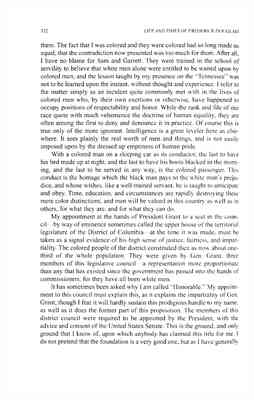Pages
166
LIFE AND TIMES OF FREDERICK DOUGLASS 318
found that I had been placed there with the hope that by "some drugs, some charms, some conjuration, or some mighty magic," I would bring it back.
When I became connected with the bank I had a tolerably fair name for honest dealing; I had expended in the publication of my paper in Rochester thousands of dollars annually, and had often to depend upon my credit to bridge over immediate wants, but no man there or elsewhere can say I ever wronged him out of a cent; and I could, to-day, with the confidence of the converted publican, offer "to restore fourfold to any from whom I have unjustly taken aught." I say this, not for the benefit of those who know me, but for the thousands of my own race who hear of me mostly through the malicious and envious assaults of unscrupulous aspirants who vainly fancy that they lift themselves into consideration by wanton attacks upon the characters of men who receive a larger share of respect and esteem than themselves.
CHAPTER XV "WEIGHED IN THE BALANCE."
The Santo Domingo controversy — Decoration Day at Arlington, 1871 — Speech delivered there — National colored convention at New Orleans, 1872 — Elector at large for the State of New York — Death of Hon. Henry Wilson
The most of my story is now before the reader. Whatever of good or ill the future may have in store for me, the past at least is secure. As I review the last decade up to the present writing, I am impressed with a sense of completeness; a sort of rounding up of the arch to the point where the keystone may be inserted, the scaffolding removed, and the work, with all its perfections or faults, left to speak for itself. This decade, from 1871 to 1881, has been crowded, if time is capable of being thus described, with incidents and events which may well enough be accounted remarkable. To me they certainly appear strange, if not wonderful. My early life not only gave no visible promise, but no hint of such experience. On the contrary, that life seemed to render it, in part at least, impossible. In addition to what is narrated in the foregoing chapter, I have, as belonging to this decade, to speak of my mission to Santo Domingo, my appointment as a member of the council for the government of the District of Columbia; my election as elector at large for the State of New York; my invitation to speak at the monument of the unknown loyal dead, at Arlington, on Decoration day; my address on the unveiling of Lincoln monument, at Lincoln Park, Washington; my appoint-
167
LIFE AND TIMES OF FREDERICK DOUGLASS 319
ment to bring the electoral vote from New York to the National Capital; my invitation to speak near the statue of Abraham Lincoln, Madison Square, New York; my accompanying the body of Vice-President Wilson from Washington to Boston; my conversations with Senator Sumner and President Grant; my welcome to the receptions of Secretary Hamilton Fish; my appointment by President R. B. Hayes to the office of Marshal of the District of Columbia; my visit to Thomas Auld, the man who claimed me as his slave, and from whom I was purchased by my English friends; and my visit to Lloyd's plantation, the home of my childhood, after an absence of fifty-six years; my appointment by President James A. Garfield to the office of Recorder of Deeds of the District of Columbia.
Those who knew of my more than friendly relations with Hon. Charles Sumner, and of his determined opposition to the annexation of Santo Domingo to the United States, were surprised to find me earnestly taking sides with Gen. Grant upon that question. Some of my white friends, and a few of those of my own color—who, unfortunately, allow themselves to look at public questions more through the medium of feeling than of reason, and who follow the line of what is grateful to their friends rather than what is consistent with their own convictions—thought my course was an ungrateful return for the eminent services of the Massachusetts senator. I am free to say that, had I been guided only by the promptings of my heart, I should in this controversy have followed the lead of Charles Sumner. He was not only the most clearsighted, brave, and uncompromising friend of my race who had ever stood upon the floor of the Senate, but was to me a loved, honored, and precious personal friend; a man possessing the exalted and matured intellect or a statesman, with the pure and artless heart of a child. Upon any issue, as between him and others, when the right seemed in anywise doubtful, I should have followed his counsel and advice. But the annexation of Santo Domingo, to my understanding, did not seem to be any such question. The reasons in its favor were many and obvious; and those against it, as I thought, were easily answered. To Mr. Sumner, annexation was a measure to extinguish a colored nation, and to do so by dishonorable means and for selfish motives. To me it meant the alliance of a weak and defenceless people, having few or none of the attributes of a nation, torn and rent by internal feuds, unable to maintain order at home, or command respect abroad, to a government which would give it peace, stability, prosperity, and civilization, and make it helpful to both countries. To favor annexation at the time when Santo Domingo asked for a place in our union, was a very different thing from what it was when Cuba and Central America were sought by filibustering
168
320 LIFE AND TIMES OF FREDERICK DOUGLASS
expeditions. When the slave power bore rule, and a spirit of injustice and oppression animated and controlled every part of our government, I was for limiting our dominion to the smallest possible margin; but since liberty and equality have become the law of our land, I am for extending our dominion whenever and wherever such extension can peaceably and honorably, and with the approval and desire of all the parties concerned, be accomplished. Santo Domingo wanted to come under our government upon the terms thus described; and for more reasons than I can stop here to give, I then believed, and do now believe, it would have been wise to have received her into our sisterhood of States.
The idea that annexation meant degradation to a colored nation, was altogether fanciful; there was no more dishonor to Santo Domingo in making her a State of the American union, than in making Kansas, Nebraska, or any other territory such a State. It was giving to a part the strength of the whole, and lifting what must be despised for its isolation into an organization and relationship which would compel consideration and respect.
Though I differed from Mr. Sumner in respect of this measure, and although I told him I thought he was unjust to President Grant, it never disturbed our friendship. After his great speech against annexation, which occupied six hours in its delivery, and in which he arraigned the President in a most bitter and fierce manner, being at the White House one day, I was asked by President Grant what I "now thought of my friend Mr. Sumner." I replied that I believed Mr. Sumner sincerely thought, that in opposing annexation, he was defending the cause of the colored race as he always had done, but that I thought he was mistaken. I saw my reply was not very satisfactory, and said: "What do you, Mr. President, think of Senator Sumner?" He answered, with some feeling, "I think he is mad."
The difference in opinion on this question between these two great men was the cause of bitter personal estrangement, and one which I intensely regretted. The truth is, that neither one was entirely just to the other, because neither saw the other in his true character; and having once fallen asunder. the occasion never came when they could be brought together.
Variance between great men finds no healing influence in the atmosphere of Washington. Interested parties are ever ready to fan the flame of animosity and magnify the grounds of hostility in order to gain the favor of one or the other. This is perhaps true in some degree in every community; but it is especially so of the National Capital, and this for the reason that there is ever a large class of people here dependent upon the influence and favor of powerful public men for their daily bread.
169
LIFE AND TIMES OF FREDERICK DOUGLASS 321
My selection to visit Santo Domingo with the commission sent thither, was another point indicating the difference between the OLD TIME and the NEW. It placed me on the deck of an American man-of-war, manned by one hundred marines and five hundred men-of-war's-men, under the national flag, which I could now call mine, in common with other American citizens, and gave me a place not in the fore-castle, among the hands, nor in the caboose with the cooks, but in the captain's saloon and in the society of gentlemen, scientists, and statesmen. It would be a pleasing task to narrate the varied experiences and the distinguished persons encountered in this Santo Domingo tour, but the material is too boundless for the limits of these rages. I can only say, it was highly interesting and instructive. The conversations at the Captain's table (at which I had the honor of a seat) were usually led by Messrs. Wade, Howe, and White—the three commissioners; and by Mr. Hurlbert of the New York World; the last-named gentleman impressed me as one remarkable for knowledge and refinement, in which he was no whit behind Messrs. Howe and White. As for Hon. Benj. F. Wade, he was there, as everywhere, abundant in knowledge and experience, fully able to take care of himself in the discussion of any subject in which he chose to take a part. In a circle so brilliant, it is no affectation of modesty to say I was for the most part a listener and a learner. The commander of our good ship on this voyage, Capt. Temple, now promoted to the position of Commodore, was a very imposing man, and deported himself with much dignity towards us all. For his treatment of me I am especially grateful. A son of the United States navy as he was—a department of our service considerably distinguished for its aristocratic tendencies—I expected to find something a little forbidding in his manner; but I am bound to say that in this I was agreeably disappointed. Both the commander and the officers under him bore themselves in a friendly manner towards me during all the voyage, and this is saying a great thing for them, for the spectacle presented by a colored man seated at the captain's table was not only unusual but had never before occurred in the history of the United States navy. If during this voyage there was anything to complain of, it was not in the men in authority, or in the conduct of the thirty gentlemen who went out as the honored guests of the expedition, but in the colored waiters. My presence and position seemed to trouble them for its incomprehensibility; and they did not know exactly how to deport themselves towards me. Possibly they may have detected in me something of the same sort in respect of themselves; at any rate we seemed awkwardly related to each other during several weeks of the voyage. In their eyes I was Fred. Douglass suddenly, and possibly undeservedly, lifted above
170
322 LIFE AND TIMES OF FREDERICK DOUGLASS
them. The fact that I was colored and they were colored had so long made us equal, that the contradiction now presented was too much for them. After all, I have no blame for Sam and Garrett. They were trained in the school of servility to believe that white men alone were entitled to be waited upon by colored men; and the lesson taught by my presence on the "Tennessee" was not to be learned upon the instant, without thought and experience. I refer to the matter simply as an incident quite commonly met with in the lives of colored men who, by their own exertions or otherwise, have happened to occupy positions of respectability and honor. While the rank and file of our race quote with much vehemence the doctrine of human equality, they are often among the first to deny and denounce it in practice. Of course this is true only of the more ignorant. Intelligence is a great leveler here as elsewhere. It sees plainly the real worth of men and things, and is not easily imposed upon by the dressed up emptiness of human pride.
With a colored man on a sleeping car as its conductor, the last to have his bed made up at night, and the last to have his boots blacked in the morning, and the last to be served in any way, is the colored passenger. This conduct is the homage which the black man pays to the white man's prejudice, and whose wishes, like a well-trained servant, he is taught to anticipate and obey. Time, education, and circumstances are rapidly destroying these mere color distinctions, and men will be valued in this country as well as in others, for what they are, and for what they can do.
My appointment at the hands of President Grant to a seat in the council—by way of eminence sometimes called the upper house of the territorial legislature of the District of Columbia—at the time it was made, must be taken as a signal evidence of his high sense of justice, fairness, and impartiality. The colored people of the district constituted then as now about onethird of the whole population. They were given by Gen. Grant, three members of this legislative council—a representation more proportionate than any that has existed since the government has passed into the hands of commissioners, for they have all been white men.
It has sometimes been asked why I am called "Honorable." My appointment to this council must explain this, as it explains the impartiality of Gen. Grant, though I fear it will hardly sustain this prodigious handle to my name, as well as it does the former part of this proposition. The members of this district council were required to be appointed by the President, with the advice and consent of the United States Senate. This is the ground, and only ground that I know of, upon which anybody has claimed this title for me. I do not pretend that the foundation is a very good one, but as I have generally
